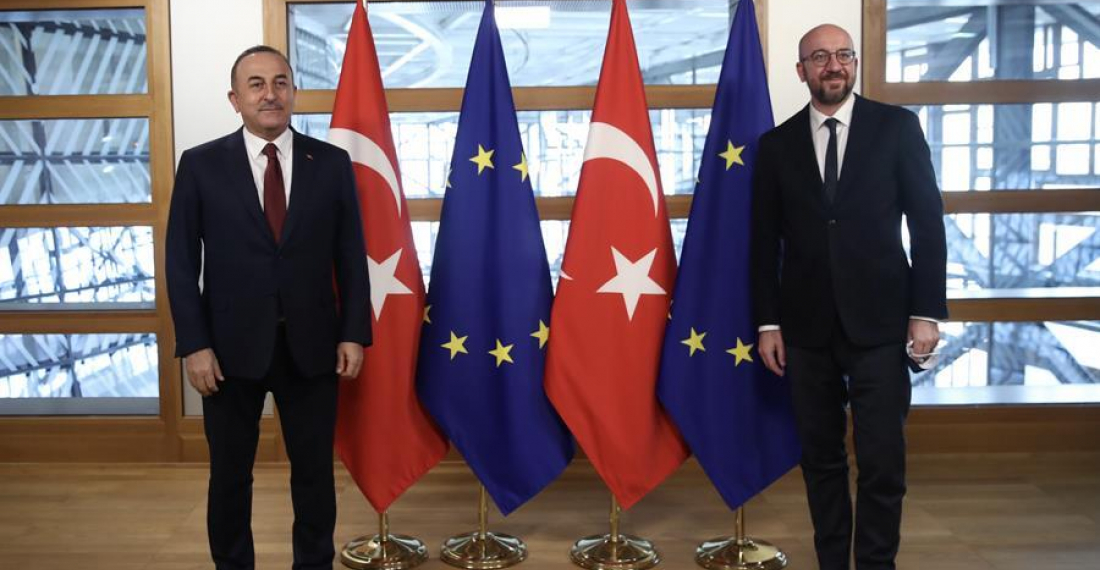After a difficult year in the relationship between Turkey and the European Union in 2020, the two sides are now actively engaged in seeking to restart the relationship, building on what worked in the past, and trying to avoid the problems that threatened to spoil the relationship.
Turkish foreign minister, Mevlut Cavusoglu was in Brussels on Thursday and Friday (21-22 January) as part of a Turkish charm offensive, ahead of visits by the president of the European Council and the president of the European Commission to Ankara later this month.
Speaking to journalists in Brussels, Mevlut Cavusoglu said "2020 was a problematic year” for relations between Turkey and the EU but a more positive dialogue has developed since the EU leaders’ meeting in December.
“We interpreted the joint statement of the December meeting as a hand extended towards Turkey and we reciprocate it in a positive way,” the minister said..
Turkey is always ready to improve its relations with any party or institution extending a positive hand, he said, adding that Turkey fulfills its promises.
“But in relations, of course, one side’s wish or dedication is not enough, and the EU should also be dedicated. And I'd like to say that in my talks with all my counterparts, I've witnessed a very positive approach and a will to improve our relations,” he stressed.
A statement posted on the website of the European External Action Service said that the talks in Brussels provided an opportunity to take stock of EU-Turkey relations in the framework set by the European Council in December, and discuss the way ahead with focus on the situation in the Eastern Mediterranean, which is a centrepiece in EU-Turkey relations.
The European Council in December invited the High Representative and the Commission to submit a report on the state of play concerning the EU-Turkey political, economic and trade relations and on instruments and options on how to proceed. The European Union has a strategic interest in the development of a cooperative and reciprocally beneficial relationship, anchored in values and principles.
Referring to the meeting between the Turkish Foreign Minister and EU High Representative Josep Borrell, the statement said that it "permitted a cordial, frank and thorough exchange of views in order to advance in this direction".
On his part, European Council president Charles Michel was more coy after his meeting with Cavusoglu, tweeting that dialogue needs to produce tangible outcomes.
Discussion on EU Turkey relationship with foreign minister @MevlutCavusoglu ahead of March #EUCO
— Charles Michel (@eucopresident) January 22, 2021
Dialogue needs to produce tangible outcomes in the interest of both EU and Turkey. pic.twitter.com/N5e4xBZbTp
In Brussels, Cavusoglu also visited NATO headquarters, where he met Secretary General Jens Stoltenberg. They discussed a range of issues, including the situation in the Eastern Mediterranean, Afghanistan and Libya.
According to NATO sources the Secretary General welcomed the continuation of NATO-brokered talks between Turkey and Greece on a military deconfliction mechanism in the Eastern Mediterranean. “The de-confliction mechanism has helped to reduce tensions and create the space for political discussions to resolve the underlying issues. I also welcome the Exploratory Talks taking place in Istanbul next week.”, the Secretary General said.
The Secretary General also thanked Turkey for its significant contributions to NATO operations and for leading NATO’s high readiness forces in 2021.
source: commonspace.eu
photo: Mevlut Cavisoglu, Turkish foreign minister, met European Council president Charles Michel in Brussels on 22 January 2021.






